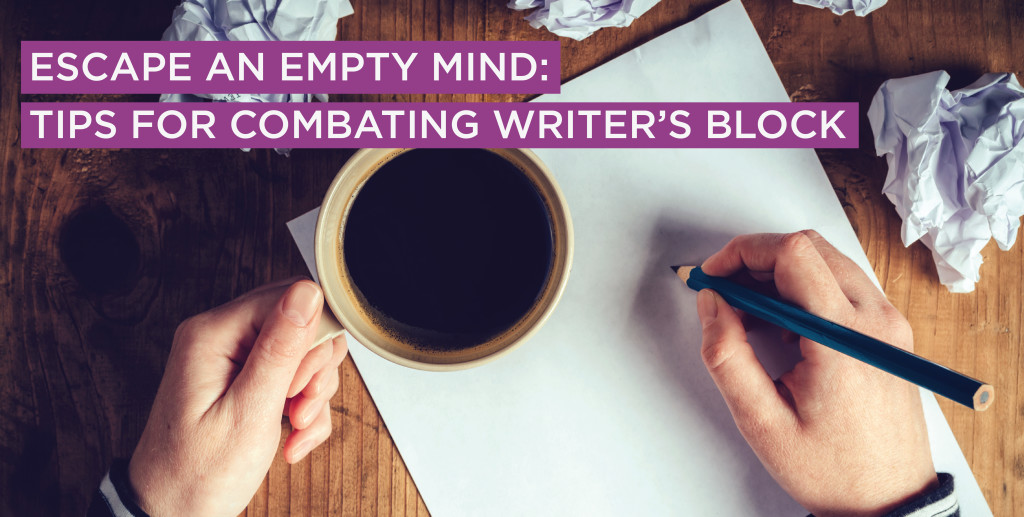Tips for Beating Writer’s Block

“There is nothing to writing. All you do is sit down at a typewriter and bleed.”
-Ernest Hemingway
While that is a graphic visualization of the creative process, there is truth behind the infamous words of Ernest Hemingway. At R&R we prefer to sparkle rather than bleed, but you get the picture. The writing process runs seamlessly when words simply pour from your brain onto paper and accurately paint the vision you’ve created in your mind. Unfortunately, it’s not always sunshine and ponies, much to the dismay of our office mascot, Rainbow Dash, from My Little Pony. There will come times when you sit down to write and your mind goes completely blank. No nouns, verbs, adjectives, nothing!
Writer’s block can be maddening, but don’t let it get the best of you. Even the best writers experience moments of creative obstruction. Here are five go-to exercises to dig you out of a rut:
- Move. Put on some music and dance it out! Get your blood flowing and adrenaline pumping. You can dance, run, walk, etc. — whatever you need to do to spike your heart rate and increase blood flow to the brain! Oxygen is required for brain function, which travels to the brain through your blood. Pumping up your heart rate will pump up your creativity.
- Free write. Take a few minutes to write about the first thing that comes to mind. It can have absolutely nothing to do with the subject you intended to write about, but that’s the point. Switch your focus to something else so you don’t get stuck in one place. Forget punctuation, grammar and spelling, and just write. You can recap a dream, write a short story or journal some frustrations. Hemingway also said,
“The only kind of writing is rewriting.”
Don’t focus on getting it perfect the first time. Leave room for errors — after all, no one is perfect, so your writing doesn’t have to be either, especially on a first draft.
- Eliminate Distractions. Have you ever found yourself mindlessly scrolling through Facebook? We’ve all fallen victim to the social media spiral! You sit down to get some work done, and 30 minutes later you’re caught up on Dan’s vacation photos and Kristen’s birth announcement. The progress on your project is still at zero percent. Get rid of those distractions! Turn your phone or tablet off. I don’t mean silence; I mean power off! If this is just not an option, put it in the other room so you’re not tempted to reach for it out of habit. Temporarily disconnect from the Internet so you can’t connect to social media on your desktop.
- Change venues. Get out of your routine and comfort zone. Find another writing venue, like a coffee shop or library. This will provide the opportunity for human interaction but on your own agenda. Changing your environment delivers new stimulants, which may flip a creative switch in your mind.
That said, consider a new venue for each writing session. If you return to the same coffee shop, same table, same cappuccino, you’re just forming another routine. Switch it up! Create a list of venues and pick a new spot each time. One of our go-to sites for bucket-list — well, lists — is Thrillist. To get you started, here are the Best Craft Coffee Shops in Atlanta, according to Thrillist.
Maybe even take it a step further and change writing utensils! Grab a pen and paper and actually write it out by hand.
- Know your routine and stick to it. Understand when you create your best work and plan your schedule accordingly. If your creative juices flow fastest early in the morning, sit down and start writing as soon as you turn your alarm clock off. If you’re a night owl, you may be more productive during the evening hours right before you shut your brain off for the day. Recognizing these creative characteristics will help you target your peak production time so you have more successful writing sessions.
You also don’t have to write a novel in one sitting. If you’re working on a long piece, plan ahead and break it up. Commit to writing for a certain amount of time, number of pages or number of words every day. Stick to your goals. Writing is a process, so don’t overcomplicate it and stress yourself out!

